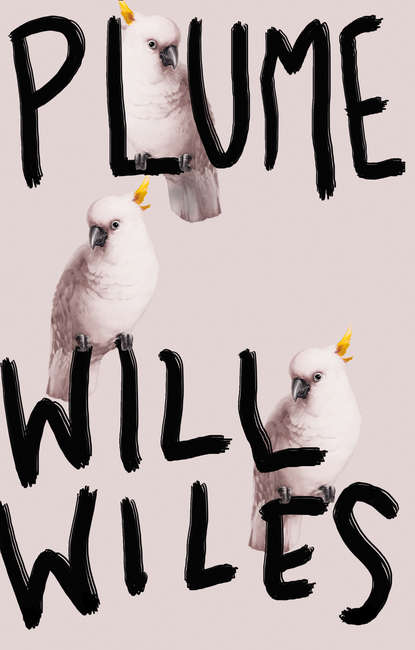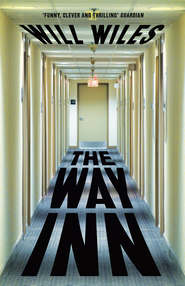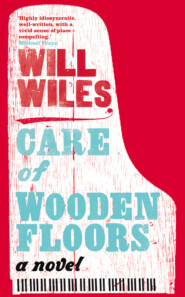По всем вопросам обращайтесь на: info@litportal.ru
(©) 2003-2024.
✖
Plume
Автор
Год написания книги
2019
Настройки чтения
Размер шрифта
Высота строк
Поля
Pierce stopped what he had been doing – pouring milk into a little jug – and frowned over his shoulder at me.
‘F.A.Q.,’ I said, surprised he needed prompting. ‘Given that he’s all over the internet.’
‘Aha,’ Pierce said. ‘Well, that doesn’t count. It’s concocted. Francis is his middle name. Eric Francis Quin. He ditched the Eric and added the A in the nineties. The A doesn’t stand for anything.’
‘I didn’t know that,’ I said.
‘Not many people do, I think,’ Pierce said. ‘He doesn’t publicise the fact. I only know ’cause I’ve been to his flat. I saw some post there and asked about it. I think he’s embarrassed by it now. I mean, FAQs are a bit dated. A bit web one-point-oh for Francis. A bit of sleight-of-hand with the facts on some bulletin board twenty years ago and it ends up haunting him like that.’
‘Yeah, embarrassing,’ I said. I was starting to feel a bit wobbly. In the past, my legs had betrayed me when others were watching and it was a misfortune I wanted to avoid with Pierce. Especially as it was all going well so far – my lateness barely remarked upon, not having to compete with Alan, Pierce proving chatty, not the surly, laconic artist-hermit I had expected. ‘He should update it.’
‘Ha, yes,’ said Pierce. ‘S.T.F.U., maybe.’
I returned to the sofa. ‘Did Alan get any pictures of you with the map?’ I asked, full of hope. It would make a great opening-spread image, Pierce against this conspiracy-theorist palimpsest, the city and the surgeon of its dark heart. What a way into the piece. It would write itself.
Pierce approached carrying a tray, on which there were two steaming mugs, a bowl of sugar and a milk jug. This struck me as a touch genteel, the little white milk jug in particular, which isn’t bad as material goes – people acting against type. What would an ‘in character’ Oliver Pierce have offered me? Supermarket whisky? A line of speed? A punch to the throat?
Mention of the map made Pierce wince again. He settled into an armchair. ‘Yeah, he did. But do you have to talk about the map? Like I say, I’ve been meaning to get rid of it.’
‘Sorry. It’s hard to ignore. Perhaps if you told me what it was for, and why it’s not needed any more … Wait, hang on.’ I didn’t want to take any chances with this, and fished my other DVR from my bag. ‘Do you mind if I record this?’
Pierce shook his head, assenting. I turned on the DVR and set it on the coffee table between us. Two DVRs, one on the table, one in my pocket – one would have to work.
‘After I wrote Night Traffic – no, before that, even, I had been lumped in with all that psychogeography lot, Iain Sinclair and Will Self and so on, and I … well, I didn’t like that. There are so many people doing that shit now. All the fucking lost rivers, ghost Tube stations, all that shit – I’m just so fucking sick of that. It makes me want to puke. It was getting boring ten years ago, it’s just intolerable now. And the whole ideological project that goes along with it, all about tracing out the London of the Kray twins and the industrial past as a revolt against the corporate takeover of … I mean, I fucking hate what London is becoming, what it has become. Fucking hate it. This fucking shiny cloakroom for the biggest bastards in the world. But one of the reasons they come here is because of the trendiness, the grit, all that fucking mystique-sludge that’s getting dredged up from the Thames 24/7. Did you read my eels piece, with the Russian girls, the oligarchs’ daughters, Anastasia and that? They fucking loved all that. They had read Mile End Road, that’s why they got in touch with me, like I was a fucking tour guide. One of them had a copy of Ackroyd’s London biography, she brought it along. The East End, that’s what they wanted. The Blind Beggar, sarees, National Front, Jack the Ripper, they wanted all that as much as Knightsbridge and Chelsea. So what could I do? Trying to get the city back by writing about all that stuff, that was doomed. It’s just advertising, it just sucks in more cash. In the end, that’s one of the things that motivated me to write Night Traffic, to do something that wasn’t shabby-chic but terrifying, something …’
He trailed off, staring into space, in the direction of the window. Then he turned his attention to his coffee, putting in a slug of milk and a lump of sugar from the bowl. I wanted him to complete the quote. It was hard to believe how well the interview was going, to have this great mass of quotable, fiery material up front, but I desperately wanted him to finish the thought. My eyes flicked to the DVR on the table, making sure the red light was lit, and the timer was counting upwards.
‘Something real?’ I supplied. ‘Something true?’ If he accepted either of those, I could stitch the word into the quote and make it whole.
‘Do you take yours black?’ Pierce asked, offering me the milk. ‘Anyway. I was trying to think of other strategies. I thought I might try to shut down the psychogeography business in London once and for all. If I could write the ultimate psychogeographical index of London, gathering up and pinning down every mystical wrinkle, backwoods fact and obscure snip of folklore – a psychopedia of London – I could make the field obsolete. A Key to all Mythologies, like Casaubon in Middlemarch. And that’s the problem: the Casaubon Complex. It can’t be done. Not that London is somehow special, although it is very big and very old. But I could take a lifetime doing it and it still wouldn’t be finished. And what if I did finish it? A 5,000-page, multi-volume slab of what amounts to pub trivia; it would only fuel the fire. It would be on the Zaha Hadid coffee table in every penthouse in Docklands.’
He turned in his chair, away from me, towards the map, shoulders hunched, tense. ‘I squandered months, years.’
‘Is that what you’ve been doing since Night Traffic?’ I asked. I couldn’t help but feel disappointed. As secret projects went, it was not what I expected, not very exciting, and not even going to happen.
‘No, no,’ Pierce said, looking back at me, scowling. ‘I stopped working on that ages ago. When Quin got involved. He came to one of my readings, for Murder Boards. Said he was a fan. Said he was working on a new mapping system for London, part map, part social network – this was Tamesis, but at the time they had a code name for it, Canny Valley. He wanted my input. Obviously, mapping, maps, I told him about my map. He loved it. He had this place swarming with Bunk staff, photographing, scanning, measuring, indexing, getting everything. Not just the psychopedia, some of the stuff I had gathered for Murder Boards too. Quin in the middle, sitting where you are now, laptop on his lap, issuing commands. Commands I didn’t even understand. Then they left. And they didn’t leave a trace. It was like Burning Man. But they did leave me a toy.’
Pierce leaped out of his seat, and the abrupt movement made me jump. He went over to one of the filing cabinets, opened the top drawer, and took out a tablet computer.
‘An interface for updating the map,’ Pierce said, returning to his armchair. He had switched on the tablet and handed it to me. ‘If I added anything, they wanted to know it.’
The tablet was showing the Bunk logo, cheerful italic sans-serif capitals pushing into the future. The many-pointed star around the B was spinning as the software loaded: a sight familiar to anyone who has used Tamesis, Roamero, Trenchr, or any of Bunk’s other apps. Then, a welcome screen: a picture of the wall-map with HI, OLIVER! In big, friendly letters over it. TOUCH ANYWHERE TO BEGIN. I touched the screen. A login box appeared.
WHOOPS! YOU DON’T HAVE PERMISSION TO DO THAT.
PLEASE VERIFY BUNKMATE I.D.
‘Yeah, it doesn’t work any more,’ Pierce said. ‘I’ve been locked out. I guess F.A.Q. doesn’t want me mucking around in Tamesis now that it’s live and everyone uses it. We had a bit of a falling-out and I don’t think he trusts me any more.’
This was news to me. When Quin had mentioned Pierce back when I interviewed him last summer, it was to name him an inspiration, collaborator and friend. ‘An agent of the true city,’ Quin called him. A couple of weeks ago he had suggested I interview the author, leaving no impression that the ardour had cooled.
‘What did you fall out about?’ I asked.
Pierce shifted in his seat uncomfortably. ‘Various things. I found out he was writing navigation software for the Met.’
‘For the Met? The police?’
‘Yeah. They’ve got this drone – unmanned aerial vehicle – kind of a prototype. Except it doesn’t work. It’s junk. They – the Met – thought part of the problem might be the onboard software. And since mapping is Bunk’s big thing, Quin’s big thing – Roamero, Tamesis, all that – they asked him to take a look. All hush-hush. The trouble with Quin is curiosity. For all his radical pose, he’d agree to anything if it meant being able to poke around inside the hot brain of a police vehicle. He was embarrassed about it and he told me – partly because he wanted to excuse himself for having agreed to take a look, I think – that it was a total turkey. A dodo. Classic bureaucratic fuck-up. Barely up to the job of finding a lone pick-up in the desert, let alone spotting who’s carrying the knife outside a Camden pub. “It’ll never do what they want it to do,” he said. And’ – Pierce gestured towards the TV, which was turned off – ‘it turns out he was right.’
I didn’t know what this last part meant, but I was too preoccupied with the rest of what Pierce had said to pick up on it. Quin, working with the police? His image had a wide stripe of anti-establishment idealism, coloured by tech-industry optimism: giving people the tools to get around the Man, direct democracy, that sort of thing. During one of the surveillance scandals he had been on Channel 4 News to say that he would never give user data from Roamero or Tamesis to the police or GCHQ. They hadn’t asked, but Quin had seen a public relations opportunity and seized it with both hands. He was on form – articulate, scornful, glowing with righteousness. The only time Cathy Newman managed to wrongfoot him was when she asked how he would feel if criminals exploited Tamesis. The strangest expression appeared on his smooth, innocent face, certainly not an expression one tends to see on these TV interviews: distraction, deep focus, as if he were repeating the question to a deeper part of himself. ‘I can’t imagine how criminals would use something like Tamesis,’ he said at last.
The thought that he could go from that idealistic naïf to being a man designing software for a police drone was staggering. But I was here to interview Pierce.
‘Let’s get back to you,’ I said. ‘What are you working on at the moment?’
‘Not very much, to be frank.’
‘Nothing, really?’
Pierce sighed. ‘Well, there was the grand psycho-concordance of London that ate up so much time and energy. Ever since I abandoned it I have been a bit stuck.’
‘No plans? Ambitions?’ I must sound like Polly, I thought, and that reminded me of her neat list of times and her, if you get a moment, mandatory tasks.
Pierce sighed again, bringing his whole upper body into the action, shoulders slumping – as if the will to go on was visibly deserting him. It was bizarre that the voluble, gossipy creature of a couple of minutes ago should yield to this exhausted, taciturn presence.
‘The encyclopedia was part of a broader project – if you can call it a project, more of an ambition,’ he said. ‘The same project, in fact, as Night Traffic. An attempt to discover something about the city. I don’t know where that project is going now.’
I checked the DVR, but only out of instinct, and watched the seconds climb, recording useless, dud material.
‘So this larger project …’ I began.
Pierce rolled his eyes. ‘You know that stuff they used to put in shower gel? I think they’ve banned it. These little particles, little grains of plastic. It was always called, I don’t know, “dermabrasion microbeads” and I guess most people thought it was pumice or pulverised seashells or something, but it wasn’t, it was plastic, tiny specks of plastic. All this plastic going straight down the plughole, into rivers, into the ocean. Fish eating it. Seabirds eating it. It was poisoning everything. Those big swirling garbage patches in the oceans, they’re not all Lucozade bottles and Ninja Turtles, most of it is this plastic dust that is almost too small to see. But it’s choking up everything. Anyway, that’s what I think of when I read a lot of writing about London: synthetic grit. Plastic that makes you feel a little better for a moment or two, a little invigorated, and then it poisons the world.’
This reminded me of a few passages from Night Traffic – Pierce had written about sitting in his flat after the attack, surrounded by novels and non-fiction about the gritty, grimy, real city having just encountered genuine crime, and feeling that he was surrounded by fraud, including his own work – especially his own work.
‘You talk about that in Night Traffic, don’t you? About craving an authentic experience in the city, something not commercial and not nostalgic, not packaged, but real …’
‘Yeah, yeah,’ Pierce said, although there wasn’t much in his reply that was affirmative. Instead he appeared embarrassed, with those broad shoulders still hunched forward, staring into his coffee as if he expected the cadaver of a family member to come bobbing to its surface. ‘That, that’s what I wanted to do.’
I tried not saying anything – that old trick of barristers and psychotherapists – to see if he volunteered more information, but nothing came. The DVR recorded the silence of the room, the small sounds of the leather seats, a muted police siren from the direction of the main road. This was going exactly the way that Freya had predicted: he simply did not have anything new to say, and was unwilling to return to subjects he had talked about in the past. A few quotes about a years-old book and abandoned projects weren’t going to be enough, and not enough time had elapsed for this to be a Whatever-Happened-To piece, all melancholy thoughts about the fleeting nature of fame and the callous muse. Those weren’t the magazine’s style, anyway: Eddie wanted fresh, up-and-coming, ahead of the curve, stylish. Not worn-out artists and their sadsack regrets. It’d be ten pages on De Chauncey, then, about his suits and his cars and the secrets of his success.
The coffee Pierce had made was good, but I wondered if he had left it too long on the stove. As I drank it, I was becoming more and more aware of a burned taste accumulating in my mouth.
‘The reaction to Night Traffic was extraordinary,’ I said. ‘Did you feel overwhelmed? Is that why you …’ I realised that I did not have a good way to describe exactly what it was that Pierce had done. Withdrawn from view? Become a hermit? Fucked up his career, just as he was now fucking up mine? ‘Why you stopped writing?’
At last, a strong reaction: Pierce looked up sharply and the eyes got me again. ‘Stopped writing? What makes you say that?’
‘Everything you’ve been saying,’ I said. ‘No new books, no journalism, not even working with F.A.Q. – you sound completely blocked.’







